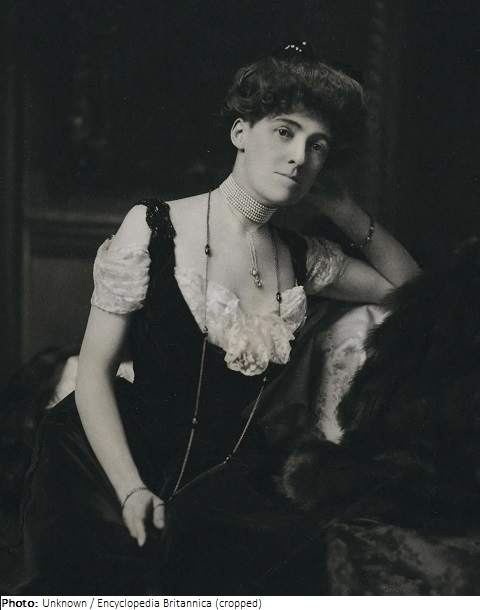
| Roles | Referee |
|---|---|
| Sex | Female |
| Full name | Edith Newbold•Wharton (Jones-) |
| Used name | Edith•Wharton |
| Born | 24 January 1862 in New York, New York (USA) |
| Died | 11 August 1937 (aged 75 years 6 months 18 days) in Saint-Brice-sous-Forêt, Val-d'Oise (FRA) |
| NOC |  United States United States |
Edith Wharton was born Edith Jones into an aristocratic New York family. She was educated exclusively at home, making use of her father’s library. In her later life, Wharton fought against this type of education and social constraints and started inventing stories from an early age, playing them to her European nanny. During a trip to Europe with her family, she contracted typhoid and barely survived. Occasionally, she published poems under pseudonyms.
In 1885, she married Edward Robbins “Teddy” Wharton (1850-1928), a Boston banker 12 years her senior. Together they lived in New York, later in Rhode Island, and in Massachusetts. The marriage broke down following the affairs of Teddy with younger women, but also due to his mental health deteriorating. In 1913, her marriage ended in divorce. In 1908, Edith Wharton moved to Paris and started an affair with a Times journalist, the great love of her life, but the relationship only lasted three years.
Wharton continued to write novellas and short stories and soon became well known. Her first book, however, was to become a standard work of interior design, titled The Decoration of Houses and published in 1897. Wharton traveled extensively, helping refugees during World War I, and wrote war reports for American newspapers. She was appointed Knight of the Legion of Honor in 1916. In her salon, she met many intellectuals of her time. In France, she owned two houses, one near Paris and the Castel St. Claire near Hyères.
To the United States Wharton returned just once in 1920, to accept the Pulitzer Prize for The Age of Innocence, the first woman ever to receive this prize for literature. Central themes in her verbally polished social novels were social conflicts, repressed sexuality, outmoded social structures, and the status of the nouveau riche. In the late 1920s, she was elected to the American Academy of Arts and Letters and nominated for the Nobel Prize three times. In 1923, she became the first woman to receive an honorary doctorate from Yale University. Considered old-fashioned after her death from a stroke, a biography and director Martin Scorsese’s movie adaption of Age of Innocence (1993) sparked new interest in her work.
| Games | Sport (Discipline) / Event | NOC / Team | Phase | Unit | Role | As | |
|---|---|---|---|---|---|---|---|
| 1924 Summer Olympics | Art Competitions |  USA USA |
Edith Wharton | ||||
| Literature, Open (Olympic) | Final Standings | Judge |